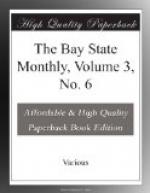Senator SUMNER was once asked by Lord Brougham the origin and meaning of “caucus,” and he replied: “It is difficult to assign any elementary to the word, but the most approved one referred its origin to the very town, and about the time (1772), of his lordship’s birth.” There is a tradition in Boston that “caucus” was a common word here before the Revolutionary war broke out, and that it originated in a feud between the British troops on the one side and the rope-walkers and calkers on the other. Bloody collisions, it is said, occurred between them. The latter held meetings in the calkers’ hall in the lower part of the city, at which resolutions were adopted and speeches made denouncing the soldiers, who, on their part deriding the wordy war offered, sneeringly snubbed their opponents “The Calkers,” which by an easy corruption became “the caucus,” and finally a term to denote the meetings.
Whether this be the origin or not of the word, one thing is certain—Mr. George W. LAWTON has done a most commendable thing in the publication of his little book on The American Caucus System.[9] It is exceedingly useful, and the wonder is for us why some such work has not earlier issued from the press, for it meets the requirements of the multitudinous politicians and others who are never absent on “caucus nights.” The author begins at the beginning of his theme, and shows how easily men, that is, mankind in general, choose to be controlled by political power, and to bear its burdens; he then establishes the axiom that the direction of political power is with the caucus, and goes on still further to explain what gives the caucus its authority, to compare caucus nominations with self-nominations, and then historically to trace the growth of the caucus, and, lastly, to describe the proceedings of, and how to conduct, a caucus meeting. From first to last, these pages are suggestive, timely, and embody a great deal of good sound sense.
* * * * *
The late Mr. Walter Bagehot left behind him some materials for a book which promised to make a landmark in the history of economics, by separating the use of the older, or Ricardian, economic reasonings from their abuse, and freeing them from the discredit into which they had fallen through being often misapplied. Unfortunately he did not complete more than the examination of two of their postulates, namely, the transferability of capital and labor. These were originally published in the Fortnightly Review, in 1876, and are now republished, with some other materials for the author’s proposed work, under the title of The Postulates of English Political Economy.[10] These essays, which emanated from a well-trained, scientific mind, an independent thinker, and one who was perfectly free in his criticisms, deal almost exclusively with one side of what the author wished and intended to say; but as they stand, they prove that had he lived he would have shed much light on the problem, how the rapid changes of modern city life may help us to understand, by analogy and indirect inference, the slow changes of a backward people.




